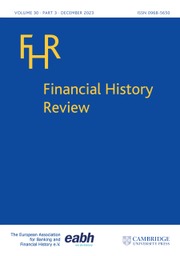Financial History Review is fast approaching the age of majority. Four years ago the journal completed a successful transition to adulthood with the exit of the last of the founding Editors, Youssef Cassis, who – together with Phil Cottrell – had contributed so much to establish it as a leading international journal in its early days. Since then, under the energetic management of Duncan Ross, the Review became an efficient editorial venture and further consolidated its reputation as a recognized outlet for research of high academic quality. Increasing subscriptions and citation statistics are testimony to his remarkable success in improving the appeal and reputation of the journal. Now, hard pressed by ineludible academic responsibilities and pulled into bright political horizons, Duncan has decided to pass the torch. Our academic community owes him a great debt of gratitude for arguing so generously and effectively the case for monetary and financial history from his position as Editor.
As we know too well, however, success can never be taken for granted and reversals of fortune may always loom right around the corner. Our discipline has changed profoundly in the last twenty years under the impulse of new advances in theories and empirical analysis. A growing share of high-quality research in our field, either quantitatively or qualitatively oriented, is nowadays theoretically driven or inspired, and the number of papers using advanced quantitative methods increases by the day. The Review is determined to reflect this new reality adequately and to make its findings more visible and appealing to a wider academic audience. We will also be assiduous advocates of the relevance of history for a proper understanding of present financial and monetary developments, and no less importantly for informed and educated policy responses to them. For this purpose a new section of the Review will be regularly devoted to remind us that we should never stop looking into the mirror of the past as a source of inspiration for analysis, interpretation and action.
In this exciting editorial project, the new Editor and the restructured Editorial Team are honoured to be able to count on the advice and active support of an enlarged Editorial Advisory Board. This body of outstanding scholarly level embraces now different generations of researchers whose expertise covers an impressive variety of subjects, time periods and regional areas. We acknowledge with gratitude the contribution of the members of the Board who stepped down. We are also deeply indebted to our friends and colleagues who generously accepted to serve another term or to become for the first time ambassadors of this new phase of the Review's life. I am also personally grateful to David Weiman who kindly accepted to serve for another term as Associate Editor for the USA. We both thank Laure Quennouëlle-Corre for her great contribution as Book Review Editor in the past years and welcome Matthias Morys who kindly accepted to take up the leadership of the Book Review section. Finally, we owe a sincere thank you to the members of the Cambridge University Press team for their constant encouragement and support in the process of renovation of the Review, including the brand new dress with which we make our second society debut.


